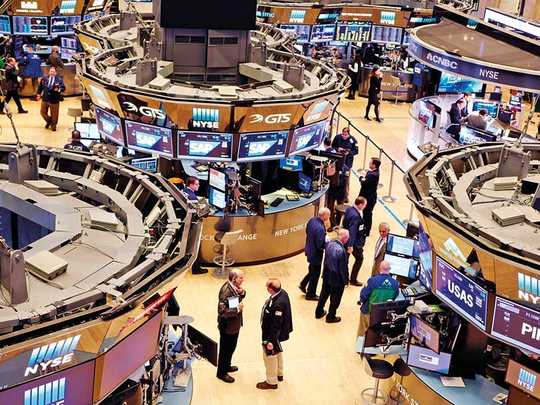
New York
Rising shares of Boeing pulled the Dow Jones Industrial Average up to a record high on Thursday, while the S&P 500 fell as investors saw higher-than-expected inflation increasing the chances of an interest rate hike.
The Dow’s third consecutive all-time high was driven in part by Boeing, which rose 1.36 per cent after Deutsche Bank raised its price target on the aerospace and defence stock.
After the bell, S&P emini futures slid 0.27 per cent after North Korea fired a missile over Japan, deepening a crisis after Pyongyang on Sept 3 tested its strongest nuclear bomb to date.
During the session, the S&P 500 and Nasdaq fell after a Labor Department report showed consumer prices rose more than expected in August, boosting the odds of another interest rate hike this year.
The consumer price index’s (CPI) 0.4-per cent gain last month was its biggest in seven months and is the last major economic data to be released ahead of the Federal Reserve’s Sept. 19-20 policy meeting.
“I don’t think the market was expecting that kind of a strength in terms of inflation,” said Victor Jones, director of trading at TD Ameritrade.
“What people want is know is whether or not Yellen is going to talk about the lack of inflation as transitory, or whether it is continuing to concern them.” After the data, the odds of a hike in December rose above 50 per cent for the first time since July, from 41.3 per cent, according to CME Group’s FedWatch tool.
The Dow rose 0.2 per cent to end at 22,203.48 points, while the S&P 500 lost 0.11 per cent to 2,495.62.
The Nasdaq Composite dropped 0.48 per cent to 6,429.08, hurt by a 0.86-per cent decline in Apple.
Six of the 11 major S&P 500 sectors rose, led by a 0.88 per cent increase in utilities.
The energy index climbed 0.39 per cent after US crude hit $50 per barrel for the first time since Aug. 10 on a bullish demand forecast by the International Energy Agency.
Helped by strong corporate earnings reports and optimism that President Donald Trump will cut business taxes, the Dow has gained 12 per cent this year.
The S&P 500, up 11 per cent in 2017, is trading at 17.6 times expected earnings, expensive compared with its 10-year average of 14.3, according to Thomson Reuters Datastream.
“I’m not taking money out of stocks, but when new cash comes in, I’m adding to our fixed income, whether that’s preferred shares, corporate bonds or mortgage-backed securities,” said Jake Dollarhide, chief executive officer of Longbow Asset Management in Tulsa.
The consumer discretionary index fell 0.54 per cent, pulled down by a 0.74-per cent decline in Amazon.com and a 0.93-per cent dip in Walt Disney.
Equifax fell 2.35 per cent after the Federal Trade Commission opened a probe into the company’s massive data breach.
Advancing issues outnumbered declining ones on the NYSE by a 1.09-to-1 ratio; on Nasdaq, a 1.20-to-1 ratio favoured decliners.
About 6.0 billion shares changed hands on US exchanges, above the 5.8 billion 20-day average.












